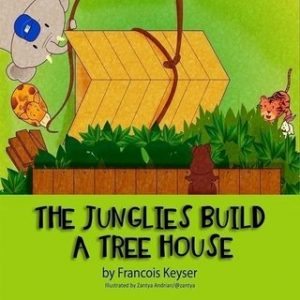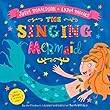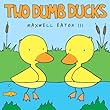In 2010, Francois left the corporate world in order to pursue his passion to be an author.
The result was the children’s book series “The Junglies” which comprises of 11 books telling stories of the adventures of five jungle animals. “The Junglies” was inspired by Francois’ eldest daughter.
He’s guest posting today on The Beauty in All of Us. Please welcome Francois Keyser!

I returned to South Africa at the beginning of this year after an absence of more than five years. I had left to work overseas 12 years before and returned a few times for vacation only.
I am staying with my parents in a beautiful seaside town called ‘Jeffreys Bay’.
As children we would spend at least one vacation every year in Jeffreys Bay and one of our favorite activities was combing the beach for seashells.
Years later I still look for seashells to collect when I am on the beach. Recently I have become aware of the fact that we always seek out the best and most perfect seashells for our collections discarding any which have the slightest damage as being ‘imperfect’ or ‘not good enough’.
While I also only used to pick up seashells which fit my definition of perfection as far as seashells go, I found myself keeping shells which were less than perfect. My primary reason for doing so was that they still looked nice in some ways but they also offered experiential and educational value for our daughters who could see the inside of seashells by looking at the broken shells.
The thought subsequently crossed my mind of how we either choose to pursue a friendship or relationship or discard people and their potential based on one meeting with them.
Many factors go into our decision aside from race, culture and religion. We may be attracted or interested in people because they are beautiful or handsome, fat or thin, have a disability or not, wear glasses or not, are male or female, have or can give us something we want, or, perhaps least of all, because we like them for who they are despite our first impressions and their outward appearances.
Even worse, we judge some cultures, races and religions based on hearsay and articles we read and see in the media despite never having met anyone from that specific culture, religion or race. When we do subsequently meet someone whom we have judged based on what we have read and heard, our first reaction is then to apply the judgment we already hold to them as opposed to being open to change our minds.
Diversity between us is a fact of life. We need to accept it. We need to accept that it does not in fact only exist between people of different races, cultures, religions or any other category we may establish.
Diversity is a fact affecting each and every one of us. We may be of same race or nationality but not one person in any system of classification we establish, is the same. You are different from your spouse or partner. Your children are different from you and each other. We are all individuals.
Why then are we prepared to tolerate our own flesh and blood but not others who differ from us in their views and values? Are we willing to overlook our differences as family because of the genetic bond between us? Can we forgive our own family because they are our family and we do not wish to accept that we can be wrong?
We look upon our children and partners habits and characteristics fondly, lovingly and proudly, eager to tell others about the unique traits that make them successful and unique in our eyes. We do so even if their behavior goes against what we have tried to teach them and would normally condone.
But if it is someone else’s child or partner, we will become judgmental of them and often distance ourselves from them. This will grow into a dislike to the extent that we will not agree with anything which they do and may subsequently extend to their family.
This attitude creates limits us and our lives. If we were to recognize each and every person as an individual and accept them for who they are we would have much larger circles of friends and be more accommodating and respectful to our fellow human beings. We would stop considering ourselves as separate from others and work together easier and more willingly to achieve common goals for with everyone’s interest at heart.
We could then truly accept each other by seeing the soul within everyone as opposed to identifying with the verbal and visual definition of each other. After all, this is how we live our own lives. We identify with our external appearance, our material wealth, our careers, and more. This is not who we are though, and nor is it who anyone else is. People are not their race, their jobs or their car.
But while the world is changing, borders are disappearing and acceptance of others improving, there is still much work for us as the older generations on our planet to do. But despite the work we have to do with ourselves and each other, we can ensure that our children do not make the same mistakes by teaching them to accept and respect others despite any diversity. The way we would have liked to have been taught.
We have the potential to take a “giant leap for mankind” of a different sort from one generation to the next if we were teach our children differently from as early an age as possible. It is simply a choice we need to make to create the change we would like to see.
And while we may argue that it takes many people to create the momentum by deciding to teach their children differently, it all starts with your decision now. And that of the next person and the next as they are influenced by articles such as this and life experiences which are shared, talked about and taught to our children.
As our children go forth to their schools daily, they will live their lives as the models we create and so the acceptance of differences and diversity will increase until the diversity in all of us becomes the accepted norm and the views which separate us into judgmental, fearful communities and groups become the new diversity we seek to live without.
Some of the children’s books which are relevant to the topic of diversity in some way or another are:
The Singing Mermaid by Julia Donaldson
This is the story of a mermaid blessed with the ability to sing beautifully. She is found by a circus master and lured into joining the circus by his false promises which take advantage of her naiveté.
This delightful book is an excellent example of our need to own and have the things we like regardless of the cost of our selfishness to others. It demonstrates how, so often, mankind exploits and takes advantage of those who less educated or aware as a result of the need for personal gain. Exploitation of others can be between individuals or nations and often diversity has a role to play.
Two Dumb Ducks by Maxwell Eaton
Our eldest daughter loved this book so much she memorized every word before she could read. This book is a classic when it comes to teaching children about diversity and bullying which can occur as a result of it. The write up from Amazon where the book can be bought online sums it up perfectly as follows:
“Steve and Carl are ducks. Steve likes cans. Carl likes socks. But Steve and Carl don’t like being called dumb by seagulls. Steve and Carl don’t get mad. Steve and Carl don’t get angry. Steve and Carl get even, though not in the way they originally intended.
Maxwell Eaton, creator of the Max and Pinky books, introduces us to two lovable and quirky ducks who kids are sure to cheer for in this clever anti-bullying book.”
Tiger Loses His Stripes by Francois Keyser, illustrated by Zantya Andrian
Tiger Loses His Stripes and all other books in “The Junglies” series have unity in diversity as a central theme. The characters are all represented by different animals and their friend, a game warden. Despite all being different they are friends and work together to overcome their challenges and have fun.
The series thus deals with the theme of unity in diversity on a neutral basis using animals as opposed to any specific race, religion or culture. In addition, the relationship of the game warden with the animals is a further representation of unity in diversity between mankind and nature.

Francois was originally born in Zimbabwe but grew up in South Africa after his family emigrated in 1980.
Francois learned to escape into books from an early age and always dreamed of becoming a published author.
But after completing his school education, Francois entered the corporate world and built a successful career in the financial services and medical assistance sectors which took him from South Africa to the Middle East and then to South East Asia where he met and married his wife with whom he has two beautiful daughters.
Francois is now working on his first book in the fantasy genre which is the book he has always wanted to write.
Francois currently lives in South Africa with his wife and two daughters and divides his time between his passions which are his family and writing.
As an Amazon Associate, I earn from qualifying purchases.




